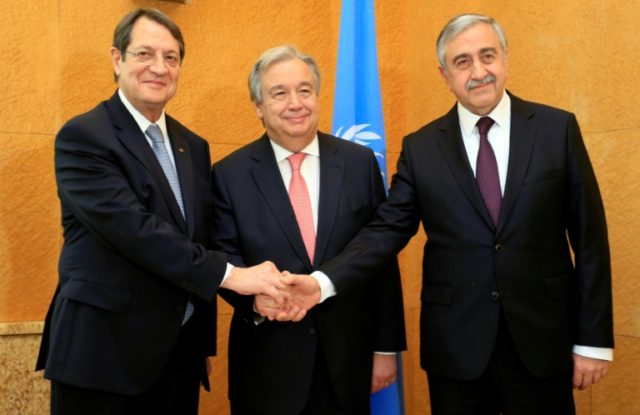Geneva (AFP) – Rival Cypriot leaders, along with top diplomats from Turkey, Greece and Britain, agreed to push on with efforts to reunite the divided island and end one of the world’s longest-running political rows.
The United Nations’ new Secretary General Antonio Guterres, who hosted the historic conference in Geneva on his first foreign trip at the helm of the world body, said a deal was “close” but not to expect a “quick fix”.
Guterres told reporters he was hoping for a breakthrough at the Geneva conference, which involved rival Cypriot sides as well as Greece, Turkey and former colonial power Britain.
The eastern Mediterranean island has been divided since 1974, when Turkish troops invaded in response to an Athens-inspired coup seeking union with Greece.
Thursday’s talks followed three days of negotiations between Greek Cypriot President Nicos Anastasiades and Turkish Cypriot leader Mustafa Akinci aiming to forge a united, two-zone federation.
“We are coming very close to what is the settlement,” Guterres said during a pause in negotiations.
But he added that major work remained on how to implement and guarantee a lasting peace.
“You cannot expect miracles of immediate solutions. We are not looking for a quick fix,” he said. “We are looking for a solid sustainable solution.”
– ‘Historic opportunity’ –
Guterres, in office since January 1, was hosting top diplomats from Cyprus’ so-called “guarantor powers”, including British Foreign Secretary Boris Johnson, and his counterparts Nikos Kotzias of Greece and Turkey’s Mevlut Cavusoglu.
Under a 1959 treaty, those nations were allowed to intervene to defend the island’s sovereign integrity, which Ankara used to justify its invasion.
The conference in Geneva for the first time brought together the two Cypriot leaders with top diplomats of the three guarantor countries to discuss security and other sticking points that have blocked progress for decades.
“The participants recognised that this is the time to bring the negotiations to a successful conclusion,” the UN said in a statement after the conference wrapped up late Thursday.
“This is a historic opportunity that should not be missed.”
Johnson said “real progress” had been made in the talks.
“With continued commitment and political will I believe a historical agreement is within reach,” he said in a statement.
Changes to or the possible elimination of the guarantor power arrangement has emerged as a key issue at the talks, along with the presence of some 30,000 Turkish troops on the island.
The Greek foreign minister restated Athens’ position that the guarantor system should be scrapped and told reporters that Turkish troops should leave Cyprus on “a timeline agreed in advance”.
Anastasiades also wants the Turkish troops out but Akinci is determined to keep a military presence.
Britain, which also retains military bases in Cyprus that are sovereign British territory, also said it was happy to do away with guarantor system if Cypriots asked, while Turkey insisted the arrangement must be preserved.
Cavusoglu however told reporters late Thursday that Turkish troops must remain on the island because “the reality is that Turkey’s guarantorship is vital to Turkish Cypriot people”.
Meanwhile, in the island’s capital Nicosia, some 200 Greek Cypriots protesting outside the presidential palace chanted “Turkish troops out of Cyprus”.
UN peacekeepers also safeguard a buffer zone between the two sides.
Kotzias said the sides were expected to set up a “team of experts” charged with the security file, with the three foreign ministers meeting again on January 23 to discuss the issue.
Cavusoglu however dismissed any meeting on January 23, saying: “The announcement of a date (by the Greek foreign minister) before reaching an agreement is not the right method.”
The UN said technical talks involving guarantor countries would start on January 18, in parallel to negotiations between the two sides in Cyprus on outstanding issues.
After that, the high-level political conference will continue to review the outcome of the technical talks.
– Maps swapped –
Earlier in the week, Anastasiades and Akinci tackled thorny domestic questions like the composition of a unified government and land swaps.
In another first, they exchanged maps late Wednesday detailing their visions of how internal boundaries should be redrawn.
Turkish Cypriot leaders have agreed in principle to return some of the land they have controlled since the failed 1974 coup.
The Greek Cypriot government said that the maps met the terms agreed during previous negotiations that foresees the Turkish Cypriot zone amounting to a maximum of 29.2 percent of the island, although disputes remain and a final version has not been agreed.
The sides have also discussed the island’s relations with the European Union, with the UN seeking to create a unified nation that would be a full EU member.
While Cyprus has been an EU member state since 2004, Anastasiades’ internationally recognised government exercises no control over the northern Turkish-ruled part of the island, and EU legislation is suspended there until a settlement is reached.

COMMENTS
Please let us know if you're having issues with commenting.